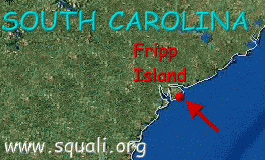 His father, Dr. Fred Heidenreich, said he was about 20 feet away from Michael when he saw him suddenly grimace and start reaching for his leg. At first he thought his son might have been hit by a stingray or jellyfish. But when he saw the torn calf muscle and blood, he knew it was something worse.
His father, Dr. Fred Heidenreich, said he was about 20 feet away from Michael when he saw him suddenly grimace and start reaching for his leg. At first he thought his son might have been hit by a stingray or jellyfish. But when he saw the torn calf muscle and blood, he knew it was something worse.The Heidenreichs are a family of physicians; Michael Heidenreich is in his fifth year of general surgery residency at the University of North Carolina at Chapel Hill; his brother is an orthopedic surgeon; their father is retired. "We were able to clean up the wound, put a compress on it, and drive Michael to the hospital," Fred Heidenreich said. "The people who treated him said they believed it to be a shark bite."
Dr. Robert Rhodin, an orthopedic surgeon with Lowcountry Medical Group, treated Michael Heidenreich. Rhodin confirmed that it was a shark bite. The wound, he said, was about 13.5 centimeters across the base of the calf and showed scalpel-like cuts. Rhodin said Heidenreich should recover satisfactorily from his injuries, although it will take some time. Heidenreich will be on crutches for at least 4-6 weeks, and probably won't be able to drive during that time. "I'll probably think about it pretty carefully before I go back into the water," he said. "I wish I hadn't gone swimming yesterday."
Kelly Heidenreich said she was playing in shallow water with her two children only a few minutes before her brother-in-law was bitten. "It's a pretty scary thing," she said. "We had just come in right before it happened." Chester Kowalski, Fripp's security chief, said his office has no records, as far as he knows, of any previous attacks. He also said he had checked other rumored shark sightings in the area but that they appeared to be unfounded. Experts said a shark attack is a rare phenomenon. According to the University of Florida's International Shark Attack Data Base, maintained by Dr. George Burgess, there are three major types of unprovoked shark attacks, the most common of which are "hit and run" attacks. They typically occur in shallow water, in the surf, and are thoughtto be cases of mistaken identity during which a shark, feeding in turbulent, murky water, bites a person instead of its normal prey.
According to the data base, some 36 attacks have been recorded in South Carolina since the late 1800s; three were fatal. In 2000 there was one recorded attack off the Isle of Palms; in 1999 there was an attack off the Isle of Palms and one off Myrtle Beach. Charles Farmer, spokesman for the S.C. Department of Natural Resources, said at least 18 shark species live in the state's coastal waters, including lemon, tiger, hammerhead, black nose, sandbar and spinner sharks.
Their numbers increase close to shore as the water grows warmer, which means that the season during which the greatest number of people and the greatest number of sharks are in the same waters is the same, Farmer said. While some of South Carolina's sharks can grow to large sizes, the occurrence of major attack in shallow coastal waters here is very rare, officials said. "I can't think of anything in our waters that would make me not go swimming or diving," said Steve Vogle, S.C. State Aquarium curator. "But certainly, it pays to take precautions."